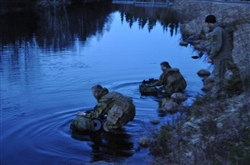Is it easier to train a cyber warrior to be a soldier or train a soldier to be a cyber warrior?
Some say it’s easier to train a cyber warrior (military specialists, law enforcement officials, computer forensics experts and civil engineers who defend national and economic security assets) to be a soldier while others say it’s easier to train a soldier to be a cyber warrior. So, which is it?
Major General Roar Sundseth, Commander of the Norwegian Armed Forces Cyber Command invited a European Command cyber delegation to his headquarters near Lilliehammer, Norway, for initial briefings and cross-talks in order to establish a long-term working relationship, and to develop and strengthen international ties and cooperation and outline the scope of future engagement activities.
During this trip, we had the opportunity to visit the Norway Defense Cyber Academy (Cyber Training School). This military university provides a four year bachelor degree programme for commissioned officers in Information and Communication Technology, with a specialization in computer network operations and system management in the physical domain and the cyber domain.
From day one, both the military profession and use of command and control information systems (C2IS) is integrated into the academic curriculum. Year 1 focuses on self-reliance and basic leadership/fundamental computer engineering; Year 2 - leadership and confidence/majors in computer systems and networks; Year 3 - practical application of leadership under demanding field conditions/specializing in systems management and computer network operations; and Year 4 - pursuing a bachelor thesis in cooperation with their unit and commissioned officer.
Practical applications through military exercises are a fundamental component of the academic curriculum. The most important lab is a two week exercise conducted for 2nd year students. CYBER ENDURANCE is a mentally and physically demanding exercise designed to:
1) Give the students EXPERIENCE in how to operate effectively in demanding, high pressure situations;
2) Allow the students to apply and gain KNOWLEDGE;
3) Create an environment to practice old and develop new SKILLS;
4) Set aside time for reflection;
5) Educate and develop the student’s use of COPING strategies; and
6) Make the students realize their POTENTIAL.
These goals are achieved by replicating a stressful military environment with complex technical missions over a protracted time period with continuous physically conditioning, uncertainty and gradual sleep and food deprivation. There are three phases within the exercise. Phase 1 replicates pre-deployment training, Phase 2 is five days of combat cyber operations (environment and terrain- rural and urban phase); and Phase 3 is reflection. During the last phase, individual and teams identify their vulnerabilities, accept weaknesses and turn them into strengths. They are encouraged to blog to express their thoughts.
On the day of our visit to the academy, students had just returned exhausted from an all night operation. While I had spent a comfortable night sleeping in my bed, they had been out all night conducting the urban phase of their combat cyber operations. Students were exhausted and given some downtime to decompress and reflect.
Which is it? Train a cyber warrior to be a soldier or train a soldier to be a cyber warrior? Thank you for reading and if you have any questions or comments, contact the International Cyber Engagement (ICE) team at ICE@eucom.mil.
 Stephanie A. Dantzler
Stephanie A. Dantzler
International Cyber Engagement Chief



Comments: 0